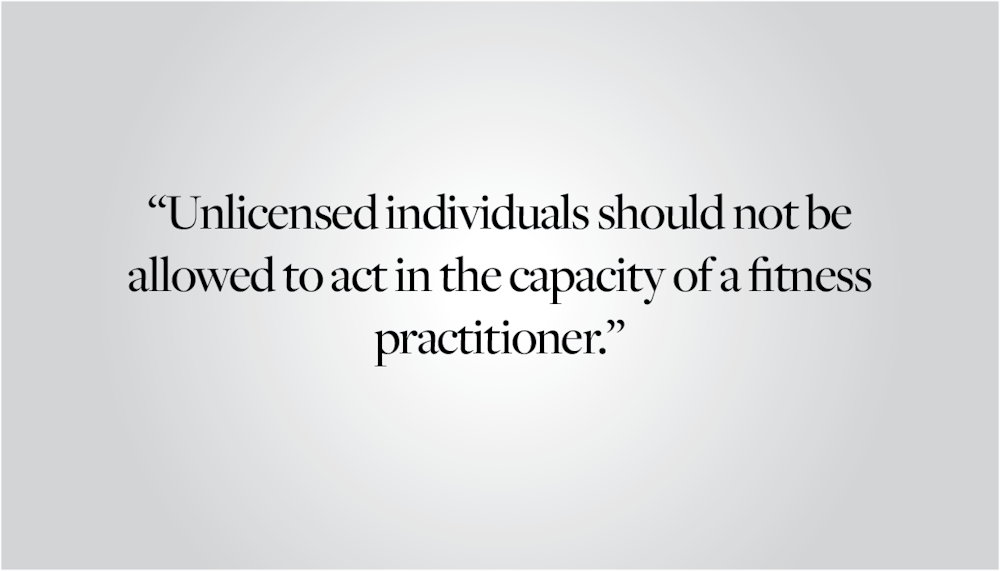I have worked in the fitness industry for nearly a decade at this point. I have worked in and consulted for many different companies and individuals in many different corners of the fitness industry including gyms of various types, the nonprofit sector, social media influencers, apps, websites, certification agencies, test prep companies, school systems, bodybuilders and more. My diverse experiences have enabled me to better understand why fitness seems to be so much harder than it should be for so many people. The problem? Most people do not know how to improve their health and fitness effectively due to wide-reaching misinformation, both online and in real-world professional practices.
We are in the midst of a fitness misinformation epidemic. Underqualified social media fitness influencers and fitness practitioners regularly advocate for unsubstantiated training practices, incorrectly explain fitness phenomena and make poor, uninformed dietary recommendations. The pervasiveness of misinformation leads to less effective training methods and less progress toward fitness goals. When the prevalence of misinformation is compounded with uncertainty about which information to trust, people might lose faith in their own ability to exercise and adherence is reduced. Regular exercise is critical purely from a health perspective, as it decreases morbidity and mortality rates.
The harm of not exercising isn’t always apparent. It can manifest years or decades down the line when someone experiences a preventable heart attack or another health outcome. Many diseases that can lead to death or severely impact quality of life can be managed or avoided through regular exercise.
The fitness misinformation contributing to these outcomes partially stems from a lack of government regulation of both who can practice as a personal trainer and the minimum level of practitioner competency in the fitness industry.
Personal training certifications vary greatly across the organizations that grant them, meaning there is no minimum standard of practice for U.S. fitness professionals. Anyone can be a personal trainer. Anyone can disseminate fitness information with false authority. Certifications are created by independent organizations and convey only that the holder meets the standards of that specific certifying body. This means that standards and information quality vary across organizations. Only a few organizations have truly high-quality standards and are managed by PhDs, such as the American College of Sports Medicine, the National Strength and Conditioning Association.
Even in some of the better cases, the amount of information required to earn a personal trainer certification is comparatively limited — similar to that of one college course. The only set-in-stone requirements for certification for most organizations are that candidates 1) pay to sit for an exam and 2) pass that exam. Some organizations base their exams on the information contained in one required textbook, and the default means of preparing for the exam is self-study. Some organizations offer optional supplementary materials that can be completed concurrently while reading the required textbook, such as videos, but both required and supplemental materials cumulatively do not offer as comprehensive a learning experience as a typical college class. Even the most stringent certifications I would consider about as dense as one graduate-level course, such as the ACSM Certified Clinical Exercise Physiologist or the NSCA Certified Strength And Conditioning Specialist certifications.
But while knowledgeable and skilled practitioners do exist, their messaging gets buried under all the underinformed professionals and pseudo-professionals out there. This isn’t the fault of any individual certified practitioner or any well-meaning certifying body. The onus lies with the government’s lack of regulation. The industry must have legally enforced standards through mandatory licensure. Those standards need to be high. Licensed individuals must have significant advanced education, such as a field-relevant bachelor’s degree before being granted licensure. In one step in the right direction, the National Strength and Conditioning Association has acknowledged the importance of instructor education by moving to require all new Certified Strength and Conditioning Specialist candidates to hold a field-relevant bachelor’s degree by 2030. Still, this is just one private organization, and more changes are needed. Unlicensed individuals should not be allowed to act in the capacity of a fitness practitioner. This will help protect against social media fitness influencers without a formal education in the fitness industry from misleading large groups of people at once — and potentially turning them away from fitness.
If a policy solution is not enacted, social media companies have the means to provide a solution. Previously, YouTube released a feature that allows licensed medical professionals to apply to receive a label on their channel indicating that they are a licensed provider. Despite the problems with the current personal trainer certification system, it may be impactful to allow certified fitness professionals to differentiate themselves from those with no educational background in fitness at all.
Tolerating low standards of education and practice within any health-related industry is a disservice to the population these industries serve. Health and fitness don’t have to be as hard as they are. Government regulation demanding more from the industry and its professionals — or self-proclaimed professionals — will better meet the public’s needs. The status quo has let everyone down. Everyone deserves better.
Domenic Angelino GS can be reached at domenic_angelino@brown.edu. Please send responses to this opinion to letters@browndailyherald.com and other op-eds to opinions@browndailyherald.com.





